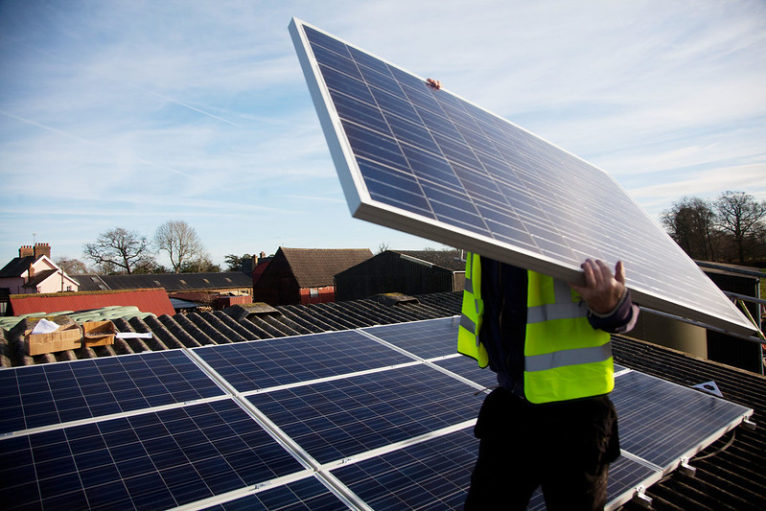Brexit, Energy & Climate Change: Some Damage is Done but There is Hope for New Talks

EU-UK relations are back in the news – which is a considerable achievement given the number of other crises and events unfolding at the same time. This blog takes stock of some of the key implications of Brexit for UK energy and climate change politics, including worsening practical relations at a time of energy security, affordability and climate crises, but also of some recent, relatively more positive, changes in the relationship.
A lot can happen in a few weeks in UK politics. Earlier this month, even as the impacts of the now infamous ‘mini-budget’ were being widely reported, the UK appeared to change its stance on the EU. Prime Minister Truss agreed to attend the inaugural meeting of the European Political Community; in a quite spectacular backtrack Northern Ireland Minister, Steve Baker, apologised for his failure to recognise legitimate Irish concerns during Brexit negotiations; whilst the Irish foreign minister, Simon Coveney, travelled to London to re-start talks with UK counterparts over Northern Ireland.
While the change in Prime Minister may affect the changed approach to the EU, a key enabler to the re-start of talks has been the delay to voting on the Northern Ireland Protocol Bill in the House of Lords. For sustainable energy the biggest news is that the UK may (re-)join the North Seas Energy Co-operation Group, whose task it is to develop offshore wind at considerable scale in the North Sea. This thus goes beyond who is in 10 Downing St.
Indeed, it is in the UK’s long-term interests to re-set the relationship not least given its geographic location within Europe and ongoing ambitions, on both sides, to rapidly increase renewables and to ensure energy security and affordability. This strategy makes yet mor
e sense in relation to EU and UK commitments to phase out imports of Russia fossil fuels. It is also the case that little pro-Brexit debate was targeted at climate change or energy policy – partly because these UK-EU relationships had been working well for both sides, underpinning increasingly inter-connected policy, markets and physical infrastructures.
Our recent article agrees with others that EU policies have been important to UK climate mitigation efforts over the years and further argues that this functioning relationship has been somewhat sacrificed at the altar of Brexit. Today, the UK’s inability to re-negotiate key energy and climate agreements look more foolish in the light of the current energy security and cost-of-living crises.
We also argue that UK climate and clean energy policymaking capacity suffered as a result of Brexit at a truly crucial time in the global fight against climate change. This is a rarely discussed aspect of Brexit, but it overtly recognises the importance of government actions in driving and enabling urgent sustainable transformations across all sectors of the economy, not just energy. The Intergovernmental Panel on Climate Change (IPCC) has repeatedly warned that policies implemented in the 2020s are crucial to meeting the Paris 1.5 degree target, not least as global emissions need to fall by 43% by 2030. The UK Committee on Climate change, whose job it is to assess government’s ability to meet legally binding targets, has observed that only 39% of required net zero emissions savings are backed up by credible policy. At the same time, energy price spikes, exacerbated by Russia’s invasion of the Ukraine and European policy responses, further worsen the already unacceptable energy poverty situation and cost-of-living crisis in the UK.
Both of these issues could have been substantially alleviated through clean energy policies, like energy efficiency and low-cost onshore renewables programmes, but instead the UK civil service has been overwhelmed with other priorities: Brexit and Covid-19. Civil service numbers were at their lowest, due to austerity cuts, when the Brexit process started and, despite Brexit and Covid-19 additions, has remained well below pre-austerity levels. Brexit has required a huge amount of policy work just to ‘get it done’, re-negotiations remain unresolved and require further civil service capacity, whilst Liz Truss has indicated her support for the proposed further 90,000 cuts in civil service jobs at a time of global climate crisis and war in Europe.
Brexit is, indeed, far from over in sustainable, affordable and secure energy terms. New electricity trade and interconnection ‘default’ rules contained in the EU-UK Trade & Cooperation Agreement are less efficient, with potential implications for the cost of trade and domestic prices. Improved trading and interconnection rules are also required to underpin the UK’s ability to benefit from the significant offshore wind projects being developed within North Seas Energy Cooperation, that are crucial to UK and EU decarbonisation plans. UK stakeholders involved have been pushing incredibly hard to renegotiate default trading agreements, indeed a new set of rules was supposed to be in place in April this year. Negotiations have, however, long been held hostage by the UK’s decisions to go back on Brexit commitments to the EU – in particular the Northern Ireland Protocol agreement.
At the same time, the UK is now left outside of vital, new EU policy programmes. The EU has moved swiftly in response to Russia’s invasion of the Ukraine, with the implementation of REPowerEU package. This package, and other policies announced, target energy affordability issues, redistributes energy profits from large corporations to citizens, sets a temporary but mandatory reduction in peak electricity usage of 5%, and significantly boosts wind and solar investments and planning processes. At the same time, in June this year the UK had implemented new measures allowing National Grid to cut off gas pipelines to the Netherlands and Belgium if the UK faces supply shortages this winter. Doing so, especially given its role as a gas bridge between Norwegian piped gas and LNG from the US and Qatar and the rest of the EU, would be disastrous for energy relations.
This is not to argue that the EU is getting sustainable and just transitions right in every respect, far from it, but to claim that it is progressing that agenda at a pace that makes the UK look sluggish. The relative estrangement of the EU and UK has been a lost opportunity over crucial years when greater co-operation could have supported both sides in emissions reduction and energy security and affordability. The UK remains in Europe geographically and, in climate and energy terms, it makes little sense for it not to co-operate closely and to maximise interconnections and trade. It is, therefore, well worth keeping a close eye on the new ‘mood music’ surrounding the EU-UK relationship to see if it continues with Sunak as PM and results in opportunities to renegotiate climate and energy relations.




